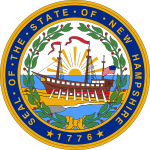Contents
| Elections in New Hampshire |
|---|
 |
The 1798 New Hampshire gubernatorial election took place on March 13, 1798. Incumbent Federalist Governor John Taylor Gilman won re-election to a fifth term, easily defeating various minor candidates.
Results
| Party | Candidate | Votes | % | ±% | |
|---|---|---|---|---|---|
| Federalist | John Taylor Gilman (incumbent) | 9,397 | 77.32% | ||
| Democratic-Republican | Oliver Peabody[a] | 1,189 | 9.78% | ||
| Democratic-Republican | Timothy Walker | 734 | 6.04% | ||
| Democratic-Republican | John Langdon | 364 | 3.00% | ||
| Federalist | Simeon Olcott[b] | 146 | 1.20% | ||
| Scattering | 323 | 2.66% | |||
| Majority | 8,208 | 67.54% | |||
| Turnout | 12,153 | 100.00% | |||
| Federalist hold | Swing | ||||
References
- ^ "NH Governor, 1798". Our Campaigns. Retrieved May 29, 2021.
- ^ Glashan, Roy R. (1979). American Governors and Gubernatorial Elections, 1775-1978. Westport, CT: Meckler Books. pp. 200–201. ISBN 0-930466-17-9.
- ^ Gubernatorial Elections, 1787-1997. Washington, D.C.: Congressional Quarterly Inc. 1998. p. 66. ISBN 1-56802-396-0.
- ^ Dubin, Michael J. (2003). United States Gubernatorial Elections, 1776-1860: The Official Results by State and County. Jefferson, North Carolina: McFarland. p. 148. ISBN 978-0-7864-1439-0.
- ^ Kallenbach, Joseph E.; Kallenbach, Jessamine S., eds. (1977). American State Governors, 1776-1976. Vol. I. Dobbs Ferry, N.Y.: Oceana Publications, Inc. p. 379. ISBN 0-379-00665-0.
- ^ "New Hampshire 1798 Governor". Tufts Digital Collations and Archives. A New Nation Votes: American Election Returns 1787–1825. Tufts University. Retrieved May 29, 2021.
- ^ Farmer, James (1772). The New Hampshire Annual Register and United States Calendar, 1833. Concord: Marsh, Capen and Lyon. p. 17.
- ^ Carter, Hosea B., ed. (1891). "Gubernatorial Vote of New Hampshire – 1784 to 1890". The New Hampshire Manual for the General Court 1680–1891. Concord: Office of the Secretary of State. p. 151.
- ^ MacPhee, Donald Albert (1959). The Tertium Quid Movement: A Study in Political Insurgency. Berkeley, CA: University of California, Berkeley. p. 68.
Notes

